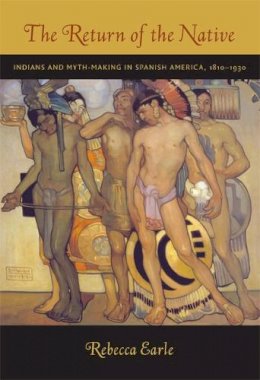Rebecca Earle is a Reader in History at the University of Warwick. She is the author of Spain and the Independence of Colombia and the editor of Rumours of War: Civil Conflict in Nineteenth-Century Latin America and Epistolary Selves: Letters and Letter Writers, 1600–1945.
“Historians interested in nationalism and myth-making will find this book remarkable in its regional scope and in the details of its explanations. This is an excellent book that illuminates how pre-conquest Indians came to symbolize the national pasts from the Rio Brava to Tierra del Fuego.” - Bridget M. Chesterson, Canadian Journal of History “[T]he achievements of this book are substantial and impressive. . . . This is a book that will stimulate new questions and debates among all historians of nineteenth century Spanish America.” - Nicola Miller, Journal of Latin American Studies “[A] fascinating, clearly written book . . . [that] investigates the importance and use of the preconquest past and ‘indianesque nationalism’ by elites in Argentina, Chile, Peru, Colombia, Guatemala, and Mexico. . . . Highly recommended.” - M.A. Burkholder, Choice “Rebecca Earle has produced an imaginative work. . . . [T]his book should serve as a benchmark against which to gauge the subsequent rise of populism; native and pan-native mobilizations and movements; and the development of counternarrative national discourses. As such, it deserves a wide audience in and outside academia.” - Susan E. Ramirez, The Journal of American History “[A] fascinating and informative picture of the ways that Spanish American elites in the first century after independence appropriated the ‘Indian’ in their attempts to create national identities for the new republics. . . . Earle’s book is an important contribution to the intellectual and cultural history of the period.” - Peter Blanchard, Bulletin of Latin American Research “[A] tour-de-force. . . a thoroughly researched and skillfully argued treatise that will reward any scholar, not just Latin Americanist geographers, interested in the ideas, and ideologies, of nationalism and nation-building, especially the distortions, exclusions, and selected borrowings that charge the project.” - W. George Lovell, Journal of Latin American Geography “In The Return of the Native we find a clever and detailed examination of key components of Spanish American nationhood, such as ideology and power, rather than a general narrative of chronological events. In addition, by taking into consideration the “indigenismo” movement that attempted to bridge the chasm, Earle not only does justice to the genealogy of a political debate, but also shows how current this debate is.” - HÉctor James, New Mexico Historical Review “An ambitious and important contribution to Latin American cultural and intellectual history, The Return of the Native is unique in its broad, comparative focus on nationalism in Spanish America and the uses of the Amerindian past. Moreover, it is refreshing in its attention to nineteenth-century historiography and the relation between that historiography and the process of state-building.”-Raymond B. Craib, author of Cartographic Mexico: A History of State Fixations and Fugitive Landscapes “[A] fascinating and informative picture of the ways that Spanish American elites in the first century after independence appropriated the ‘Indian’ in their attempts to create national identities for the new republics. . . . Earle’s book is an important contribution to the intellectual and cultural history of the period.” - Peter Blanchard (Bulletin of Latin American Research) “[A] fascinating, clearly written book . . . [that] investigates the importance and use of the preconquest past and ‘indianesque nationalism’ by elites in Argentina, Chile, Peru, Colombia, Guatemala, and Mexico. . . . Highly recommended.” - M.A. Burkholder (Choice) “[A] tour-de-force. . . a thoroughly researched and skillfully argued treatise that will reward any scholar, not just Latin Americanist geographers, interested in the ideas, and ideologies, of nationalism and nation-building, especially the distortions, exclusions, and selected borrowings that charge the project.” - W. George Lovell (Journal of Latin American Geography) “[T]he achievements of this book are substantial and impressive. . . . This is a book that will stimulate new questions and debates among all historians of nineteenth century Spanish America.” - Nicola Miller (Journal of Latin American Studies) “Historians interested in nationalism and myth-making will find this book remarkable in its regional scope and in the details of its explanations. This is an excellent book that illuminates how pre-conquest Indians came to symbolize the national pasts from the Rio Brava to Tierra del Fuego.” - Bridget M. Chesterson (Canadian Journal of History) “In The Return of the Native we find a clever and detailed examination of key components of Spanish American nationhood, such as ideology and power, rather than a general narrative of chronological events. In addition, by taking into consideration the “indigenismo” movement that attempted to bridge the chasm, Earle not only does justice to the genealogy of a political debate, but also shows how current this debate is.” - Héctor James (New Mexico Historical Review) “Rebecca Earle has produced an imaginative work. . . . This book should serve as a benchmark against which to gauge the subsequent rise of populism; native and pan-native mobilizations and movements; and the development of counternarrative national discourses. As such, it deserves a wide audience in and outside academia.” - Susan E. Ramirez (Journal of American History)

